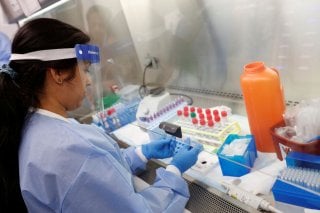How Red Tape Damages America's Response to the Coronavirus
Something must be done to fix this.
This morning, NBC Think published my opinion column discussing the sclerotic and disorganized initial response of the federal public health system to a building coronavirus pandemic.
In my column, I point out how the Food and Drug Administration’s cumbersome regulatory process resulted in a single, government‐monopoly coronavirus test, made available in limited supply, by the Centers for Disease Control and Prevention.
This process kept the private sector and foreign‐developed tests out of the process during the crucial weeks between when the first virus was identified in December and when it started spreading throughout the U.S. Meanwhile, when the tests were initially rolled out, they were found to be defective, forcing the CDC to play catch up getting new, corrected tests out to the public.
All of this was happening while other countries were already relying on tests developed by numerous private sector companies and organizations, operating under more liberal regulatory regimes.
The World Health Organization distributed a test developed by a Berlin biotech firm to 57 countries and China had five commercial tests on the market in January. South Korea enacted a reform after suffering a devastating attack of Middle East Respiratory Syndrome (MERS) in 2015 that grants nearly immediate approval of testing systems in the event of an emergency.
While the rest of the world sought to benefit from and enable private sector initiatives, the U.S. embraced a top‐down command‐and‐control approach to the present biomedical challenge, replete with red tape and poor communication with local public health officials. This is not only tragic and unacceptable. It’s embarrassing.
Only in recent days has the FDA relaxed its stringent approval process and encouraged a rapid private sector response.
Will policymakers learn from this? If the streamlined emergency approval process is a good idea in this crisis, shouldn’t it be a good idea at other times? Will regulatory policy revert to the status quo ante once this crisis passes, only to lead to similar problems later?
The rusty and rigid FDA approval process needs reform.
Policymakers, in 2018, passed the “Right to Try Act”, in support of the right of the people to try medications that may save their lives, even if they weren’t approved by a federal agency. A bipartisan Congress and President understood that people must not be prevented by the government from making an informed decision to try a drug to save their lives.
As coronavirus cases began to spring up outside of China, including a small number in the U.S., the FDA should have sought to ameliorate the shortage of test kits by granting authorization for the use of tests already in use in other countries. Just as people have the right to try medications in order to save their lives, they also have the right to try tests aimed at saving their lives.
Policymakers should revisit legislation giving reciprocal approval to drugs approved in similar countries. Reciprocal approval already exists among the 27 European Union states plus Iceland, Liechtenstein, and Norway. Such legislation was introduced by Senator Ted Cruz (R‑TX) and Mike Lee (R‑UT) in 2015, dubbed the RESULT Act (“Reciprocity Ensures Streamlined Use of Lifesaving Treatments Act), but did not pass.
Reciprocal approval is one way to show support for the “right to test.” An even better option is to allow the domestic sale of tests (and drugs) approved in similar countries even if the FDA doesn’t give reciprocal approval. The drugs and tests can carry “NOT FDA APPROVED” on their labels. Labels should also be able to state “APPROVED BY WORLD HEALTH ORGANIZATION” or “APRROVED BY THE SWISS AGENCY FOR THERAPEUTIC PRODUCTS” if applicable. Consumers would know the FDA hasn’t signed off on the test or drug, but that other reputable foreign and international organizations have done so.
As federal, state, and local health authorities rush to get tests out to people suspected of COVID-19 infection several weeks later than they should have, we hope fatalities are kept to a minimum and people can soon emerge from self‐quarantine and rebuild their lives. When the all dust settles, our federal and state regulatory regime needs a thorough update. And the right of the people to self‐medicate and self‐test needs to be reaffirmed.
This article by Jeffrey A. Singer originally appeared in the CATO at Liberty blog in 2020.
Image: Reuters.

